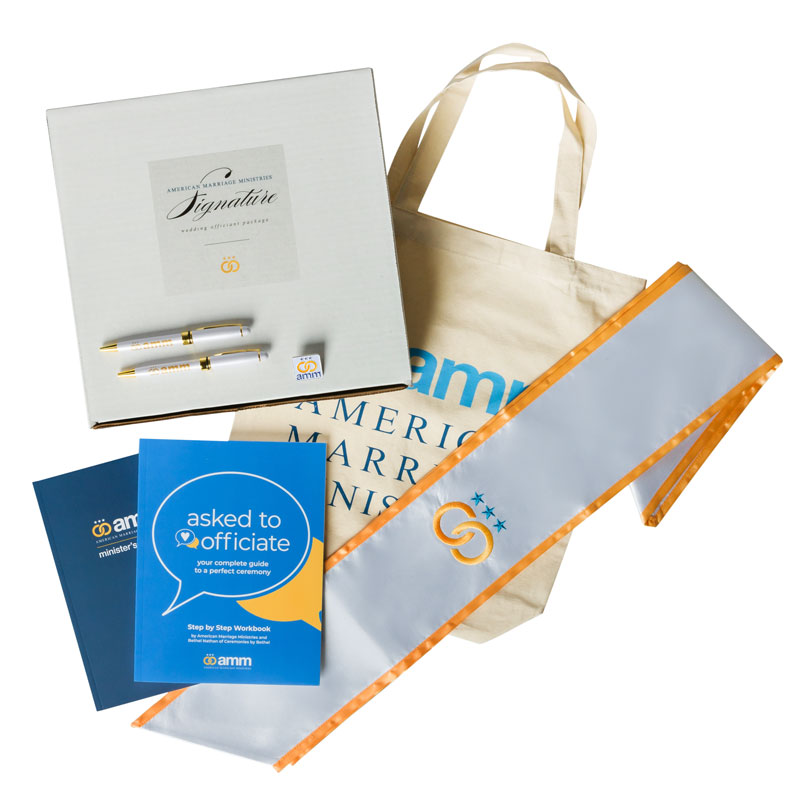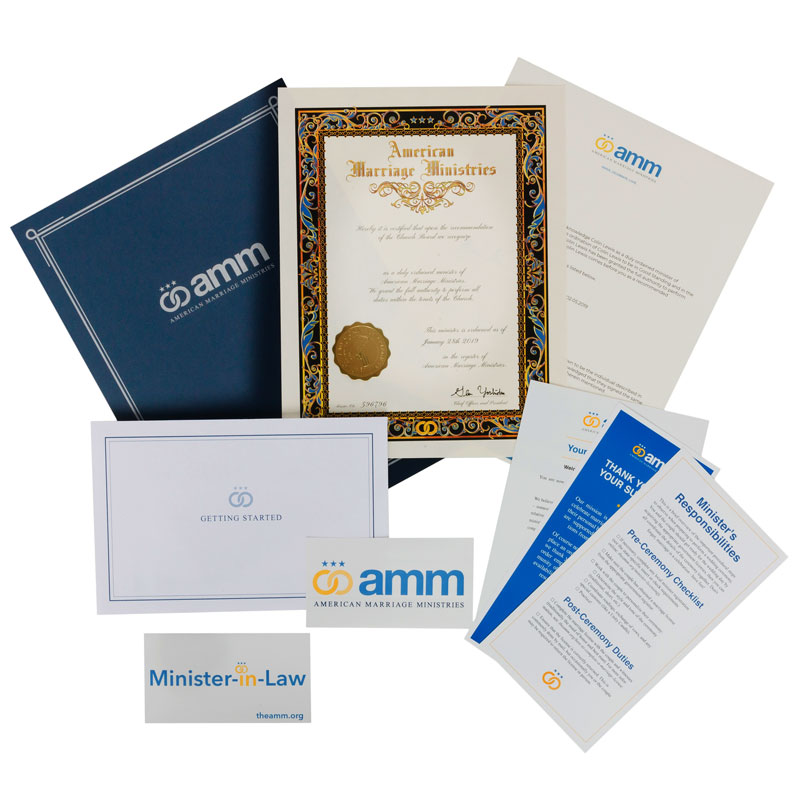Become a Pennsylvania Wedding Officiant with ourFree Online Ordination
If you are considering getting ordained online to officiate weddings in Pennsylvania, then you have come to the right place. The first thing you should know is that it is 100% legal for you to get ordained online in Pennsylvania to officiate weddings. Keep reading to learn more about why online ordinations are legal in Pennsylvania and how you can get ordained to officiate weddings anywhere in the State.
5 Pennsylvania Online Ordination Facts
Who can perform marriage in Pennsylvania?
” (a) General rule.–The following are authorized to solemnize marriages between persons that produce a marriage license issued under this part:… (6) A minister, priest or rabbi of any regularly established church or congregation. (b) Religious organizations.–Every religious society, religious institution or religious organization in this Commonwealth may join persons together in marriage when at least one of the persons is a member of the society, institution or organization, according to the rules and customs of the society, institution or organization. ”
Pennsylvania Consolidated Statutes § 1503
Does the Pennsylvania government recognize online ordained ministers?
Yes. As clearly stated in the State Law, ministers that were ordained online are no different than ministers ordained by any other means, be it in-person, or through years of seminary study. Ordained means ordained. Period. Get Ordained Now
Are wedding officiants required to register with the Pennsylvania Government?
This may come as a surprise to you, but wedding officiants in Pennsylvania do not have to register with any government office before or after officiating wedding ceremonies. There are no laws in Pennsylvania requiring that officiants register with any government office and there is no government office charged with such a responsibility.
What Pennsylvania government office must the officiant contact before performing marriage?
None. The Pennsylvania government does not have any office that registers, certifies, or licenses wedding officiants. Simply put, at no point in your journey from ordination to officiating are you required to contact or register with any Pennsylvania government office.
What is the minimum age allowed for a wedding officiant in Pennsylvania?
In Pennsylvania all wedding officiants must be at least 18 years old to be able to legally solemnize marriage. Basically, in addition to being an ordained minister, you must also be a legal adult.
How Are Pennsylvania Online Ordinations Legal?
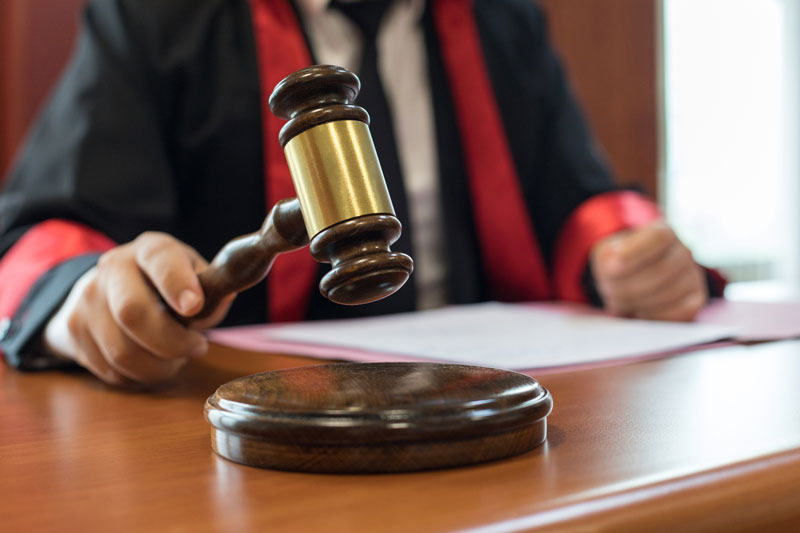
To better understand the legal underpinnings of how online ordinations work in relation to gaining the authority to officiate weddings in Pennsylvania, it is helpful to familiarize yourself with an esoteric legal term, “Solemnization of Marriage”. Solemnization of Marriage is simply a fancy way of saying, “Perform Marriage”, “Conduct a Wedding”, or “Officiate a Wedding”. Solemnize is the official act of conducting a wedding ceremony. This is how the act of performing a wedding ceremony is described in the Pennsylvania Consolidated Statutes. Below is the law that specifies who exactly can Solemnize Marriage in Pennsylvania:
Pennsylvania Consolidated Statutes § 1503
(a) General rule.–The following are authorized to solemnize marriages between persons that produce a marriage license issued under this part: (1) A justice, judge or magisterial district judge of this Commonwealth. (2) A former or retired justice, judge or magisterial district judge of this Commonwealth who is serving as a senior judge or senior magisterial district judge as provided or prescribed by law; or not serving as a senior judge or senior magisterial district judge but meets the following criteria: (i) has served as a magisterial district judge, judge or justice, whether or not continuously or on the same court, by election or appointment for an aggregate period equaling a full term of office; (ii) has not been defeated for reelection or retention; (iii) has not been convicted of, pleaded nolo contendere to or agreed to an Accelerated Rehabilitative Disposition or other probation without verdict program relative to any misdemeanor or felony offense under the laws of this Commonwealth or an equivalent offense under the laws of the United States or one of its territories or possessions, another state, the District of Columbia, the Commonwealth of Puerto Rico or a foreign nation; (iv) has not resigned a judicial commission to avoid having charges filed or to avoid prosecution by Federal, State or local law enforcement agencies or by the Judicial Conduct Board; (v) has not been removed from office by the Court of Judicial Discipline; and (vi) is a resident of this Commonwealth. (3) An active or senior judge or full-time magistrate of the District Courts of the United States for the Eastern, Middle or Western District of Pennsylvania. (3.1) An active, retired or senior bankruptcy judge of the United States Bankruptcy Courts for the Eastern, Middle or Western District of Pennsylvania who is a resident of this Commonwealth. (4) An active, retired or senior judge of the United States Court of Appeals for the Third Circuit who is a resident of this Commonwealth. (5) A mayor of any city or borough of this Commonwealth. (5.1) A former mayor of a city or borough of this Commonwealth who: (i) has not been defeated for reelection; (ii) has not been convicted of, pleaded nolo contendere to or agreed to an Accelerated Rehabilitative Disposition or other probation without verdict program relative to a misdemeanor or felony offense under the laws of this Commonwealth or an equivalent offense under the laws of the United States or any one of its possessions, another state, the District of Columbia, the Commonwealth of Puerto Rico or a foreign nation; (iii) has not resigned the position of mayor to avoid having charges filed or to avoid prosecution by Federal, State or local law enforcement agencies; (iv) has served as a mayor, whether continuously or not, by election for an aggregate of a full term in office; and (v) is a resident of this Commonwealth. (6) A minister, priest or rabbi of any regularly established church or congregation. (b) Religious organizations.–Every religious society, religious institution or religious organization in this Commonwealth may join persons together in marriage when at least one of the persons is a member of the society, institution or organization, according to the rules and customs of the society, institution or organization. (c) Marriage license needed to officiate.–No person or religious organization qualified to perform marriages shall officiate at a marriage ceremony without the parties having obtained a marriage license issued under this part.
Pennsylvania Consolidated Statutes § 1503 Explained
If this law looks like an indecipherable wall of text, don’t worry. Let’s focus in on the part that is relevant to you.
“…The following are authorized to solemnize marriages… (6) A minister, priest or rabbi of any regularly established church or congregation.”
This law allows for people of any religious faith to self actualize their ability to officiate wedding ceremonies. Beyond being articulated in the Pennsylvania Consolidated Statutes, this right is also enshrined in the 1st amendment of the US Constitution:
“Congress shall make no law respecting an establishment of religion, or prohibiting the free exercise thereof; or abridging the freedom of speech, or of the press; or the right of the people peaceably to assemble, and to petition the Government for a redress of grievances.”
We hope this better explains the legal foundation for why you absolutely have the right to officiate wedding ceremonies in Pennsylvania as an online ordained minister. As long as you are a member of any religious institution that grants you the authority to solemnize marriage, you are good to go. So what are you waiting for?
Pennsylvania Officiant Government Registration
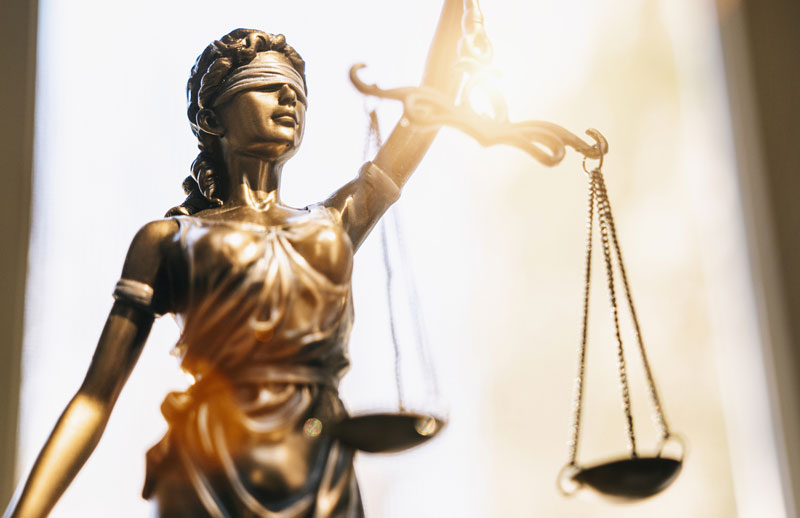
We said it before but it bears repeating – In Pennsylvania, wedding officiants are not required to register with any government office. The government in Pennsylvania does not impose any officiant registration process whatsoever. At no point in your journey from getting ordained to officiating the wedding ceremony are you required to complete government paperwork confirming your status as a wedding officiant. Once you are an online ordained minister you instantly have the legal ability to perform marriage anywhere in Pennsylvania.
Though there is no legal requirement to prove your standing as an Ordained Minister with any Pennsylvania government office, we do recommend that you keep personal records of your official Ministry Credentials. A physical copy of your Ordination Certification is useful to have in the event that the couple or anyone else affiliated with the wedding asks to see proof of your ordination.
If you choose to get ordained with American Marriage Ministries, consider ordering one of the following packages. In addition to your official ordination certificate you will also receive your “AMM Minister’s Manual” and “Asked To Officiate“. Both of these books cover all of the important information you need to know regarding your legal duties as a wedding officiant and your ceremonial responsibilities, including how to best prepare for the ceremony.
How Do I Prepare For Officiating Weddings in Pennsylvania?

Getting ordained is just the first step. The bulk of your time and energy will be taken up in preparing for the wedding ceremony. We know that conducting a wedding ceremony is a big responsibility. And though it is a joyous experience it is also one that needs to be taken very seriously, especially for your role as the wedding officiant.
We will walk you through the process from both the legal and ceremonial aspects of your role as the wedding officiant. Check out our page How To Officiate Weddings to get started. Here we cover the important things that you as the officiant need to do, such as how to best prepare for officiating a wedding ceremony and Writing the Wedding Ceremony. For more information, we encourage you to visit the official American Marriage Ministries website. There you will find the most comprehensive officiant training materials you can find online.
Many of the people that get ordained online have never officiated a wedding before. We know that this can seem intimidating and have anticipated your need to understand the entire process. Our mission is to empower you not just to officiate weddings, but to do so with skill, confidence, and dare we say, a bit of style.
Officiating a wedding in Pennsylvania can be broken down into two responsibilities. These are:
- Non-Legal Duty – Officiating the Wedding Ceremony
- Legal Duty – Signing the Marriage License
To learn more about preparing for the wedding ceremony, including how to write a wedding ceremony script, check out the Officiant Training on the American Marriage Ministries website. Keep reading to learn more about the officiant’s legal responsibilities regarding the marriage license.
Pennsylvania Wedding Officiant Legal Responsibilities
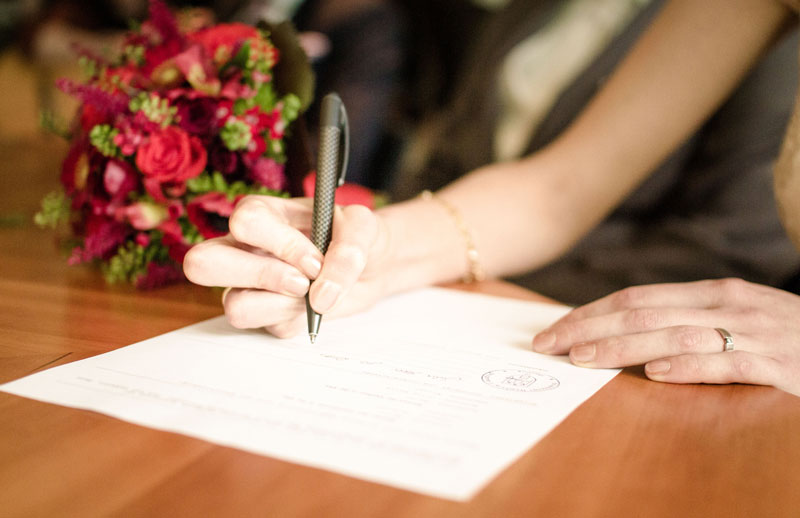
Your one legal responsibility as a wedding officiant in Pennsylvania is to sign the marriage license for the couple. This is a simple bureaucratic process that is really no different than signing any other type of legal contract.
However since it is not every day that you fill out marriage licenses, you may find some of the fields confusing at first glance. We have deconstructed the process of completing a marriage license into easy-to-follow instructions in case you find something confusing along the way. We understand how important it is to get this right, so keep reading for instructions on how to complete an Pennsylvania marriage license.
How To Fill Out an Pennsylvania Marriage License
It is your responsibility as the wedding officiant to sign the marriage license on the wedding day. We have broken this duty down into four simple steps:
- Ask the couple to present their marriage license.
- Confirm that the marriage license is valid.
- Complete and sign the marriage license.
- Return the Marriage License.
STEP 1 – ASK THE COUPLE TO PRESENT THEIR MARRIAGE LICENSE
At some point on the wedding day, you need to ask the couple to present their marriage license. Generally this happens immediately following the ceremony while everyone heads out to the reception. Though this doesn’t have to be the case, as the marriage license can be completed at any time on the wedding day before or after the ceremony.
STEP 2 – CONFIRM THAT THE MARRIAGE LICENSE IS VALID
Before you start filling out the marriage license you need to confirm that it is currently valid. A marriage license’s validity is determined by three laws that specify the marriage license waiting period, expiration, and return. If you need further clarification on what these terms mean, there is a good explanation here. The information below outlines the waiting period, expiration, and return for Pennsylvania marriage licenses:
- REQUIRED WITNESSES: None
- WAITING PERIOD: 3 Days To Receive
- EXPIRATION: 60 Days
- RETURN: Within 10 Days after the Wedding
In practice, verifying the validity of the marriage license is usually a formality. Most couples file for their marriage license a week or two before the ceremony date, in which case the marriage license, according to state law, is valid.
STEP 3 – COMPLETE AND SIGN THE MARRIAGE LICENSE
This is where the pen finally meets the paper. As the officiant you need to fill out your portion of the marriage license. When done, you must sign it with the couple and two adult witnesses (they are also required to sign the marriage license).
If you are not sure how to fill out certain fields on the marriage license, do not worry. Below are the most common questions people have regarding filling out a marriage license. The marriage license you will be completing may not have all of these fields.
OFFICIANT TITLE ON MARRIAGE LICENSE
For officiant title, enter“Minister”. If you are an AMM ordained minister, then that is what you put for your title.
CHURCH NAME ON MARRIAGE LICENSE
For church name, enter“American Marriage Ministries”. That is unless, you got ordained through a different organization, in which case enter the name of that organization.
RELIGIOUS DENOMINATION ON MARRIAGE LICENSE
For religious denomination, enter “Non-Denominational” unless you are officiating the wedding according to a specific religious tradition. If so, then enter that.
CEREMONY TYPE ON MARRIAGE LICENSE
For ceremony type, enter “Religious”. It is important to understand, even if you officiated a completely non-religious ceremony you still need to enter “Religious”. The reason for this is that the designation “Religious” and “Civil” mean something different to the Pennsylvania Government. Civil is a designation for government officials. Everything else is considered religious, even if you invoke no religious references in your wedding ceremony.
STEP 4 – RETURN THE MARRIAGE LICENSE
After the marriage license is completed it must be returned to its issuance office. This is usually the responsibility of the couple though it is a good practice as the officiant to follow-up with the couple to make sure that the completed marriage license has been returned. As this is generally done through the mail, it is an easy thing to do and we recommend that it be done ASAP after the wedding.
If you are unclear on where or how to return the marriage license, the couple should know. When the couple receives their marriage license they also receive specific instructions on how to return the marriage license. If these instructions are not included with the marriage license, you can call the issuance office or visit their website for further clarification.
Thanks for reading and go get your officiating on! To learn more about getting ordained online and how to officiate weddings, check out American Marriage Ministries.
